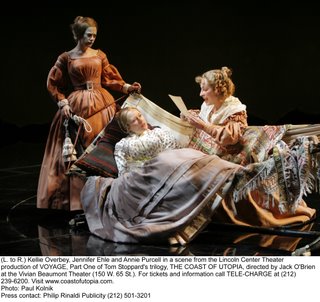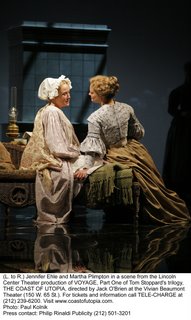The actors are uniformly fine, with Mr. Crudup and Jennifer Ehle taking top honors. Mark Bennett's incidental music adds considerably to the total effect of the production ... but I'm out of room! I'll have more to tell you in a few weeks, but so far, "The Coast of Utopia" shows every sign of being a masterpiece in the making.
The Hartford Courant has a spoilery blow-by-blow writeup of the show by Malcolm Johnson. Mentions:
As acted by Jennifer Ehle, Martha Plimpton, Kellie Overbey and Annie Purcell, they are a bright, winsome and innocent gaggle of tutored goslings, much in awe of their brother, Michael. Ethan Hawke, dashing in a red-and-blue infantry officer's uniform, endows the younger Bakunin with a cocky charm, and endless intellectual pretensions.
[...]
The headstrong Michael manages to head off the marriage of Ehle's sweet, thoughtful Liubov to Baron Renne (Andrew McGinn), a young, rich cavalry officer. But by the spring of 1835, Plimpton's more sour and tough-minded Varenka has wed her Dyakov and become pregnant. Soon, Varenka rejects her dull husband.
Link found via American Theater Web's comprehensive roundup. At Talkin' Broadway two orchestra tix to Shipwreck and Salvage are being sold for merely $30 apiece, a bargain.
Point and counterpoint: Scene 4's Michael Bettencourt vs reader Jerrod Bogard on the political impact of Voyage. Chris Nakimasha-Brown is "puzzled by the well-coordinated establishment media plugging" of Utopia. Blogger Greg found it went over his head.
Playbill summarizes the critical reception of Voyage:
The reception of The Coast of Utopia - Voyage was something of a happy surprise. The trilogy got mixed marks in London, but a winnowing of the text seemed to do the trick and the critics all sounded downright surprised that that they like the show so much. Calling it involving, exciting, expertly staged and acted, and declaring their appetite well-whetted for Part Two, they did prose back flips to convince their readers the show was more than just the snob hit of the season. An extension is expected. There's still Shipwreck and Salvage to come, and anything could happen, but for now Lincoln Center Theatre must be feeling that its millions were spent well.
Remember Shipwreck previews open on Weds Dec 6, with Ms Ehle in the lead female role of Natalie Herzen.
PS. From tomorrow morning I'm on furlough...with a stop at the front lines on Dec 9-10, when a group of us are going to see Utopia. Yay! Come say hi if you're there - look for hyperventilating females. Depending on time and net availability there may be reportage from the trenches. Otherwise, til Jan 5, Chelsea's holding the fort solo (owe ya!). I'll be checking the jenniferehle@gmail.com inbox when possible, but if you have anything important forward it to jenniferehle2@hotmail.com, Chels' "work" address. Reports and tips etc would be great. She is going on a short trip next weekend as well, so you'll have to fend for yourselves for a few days.









